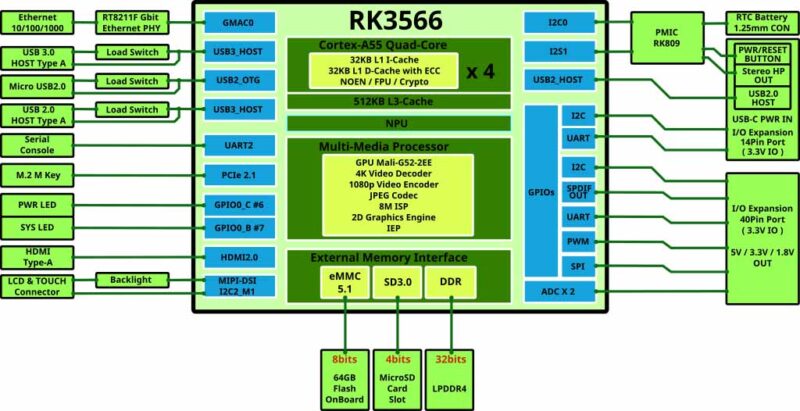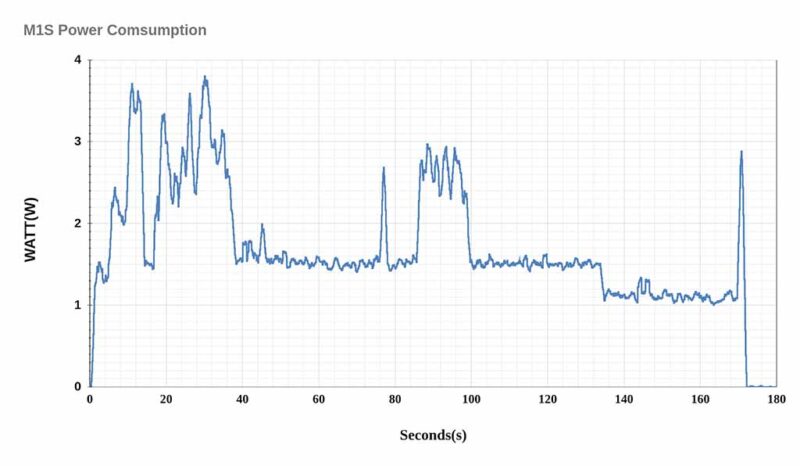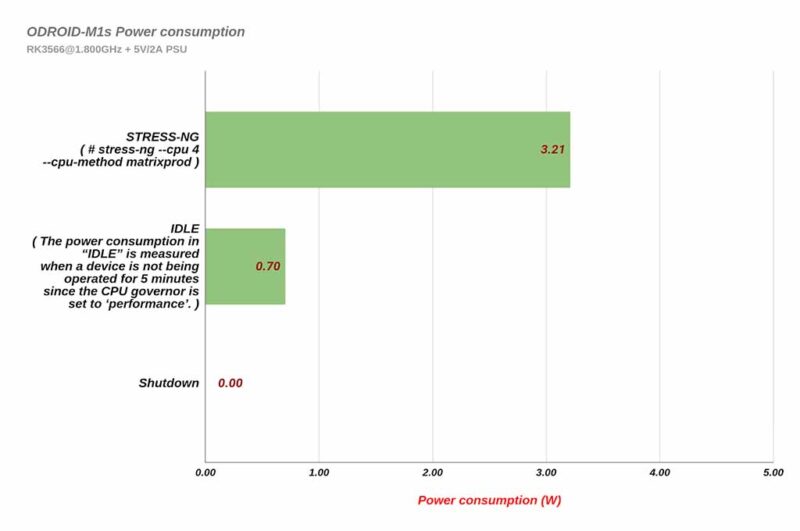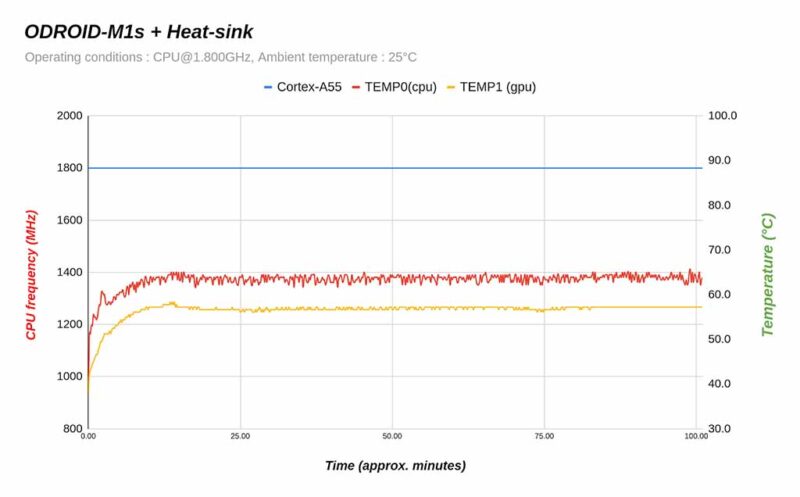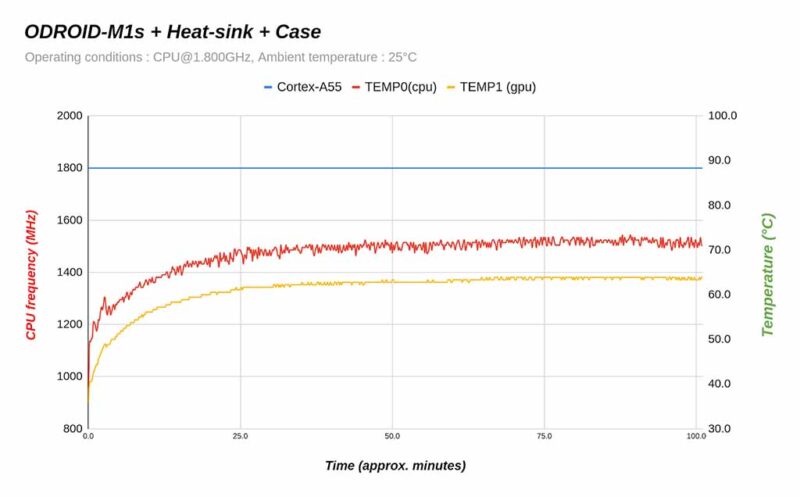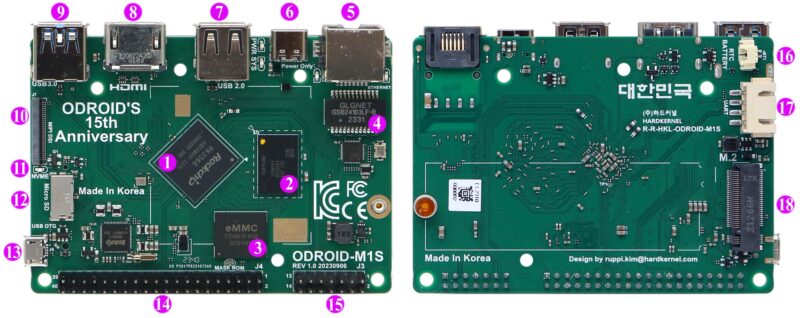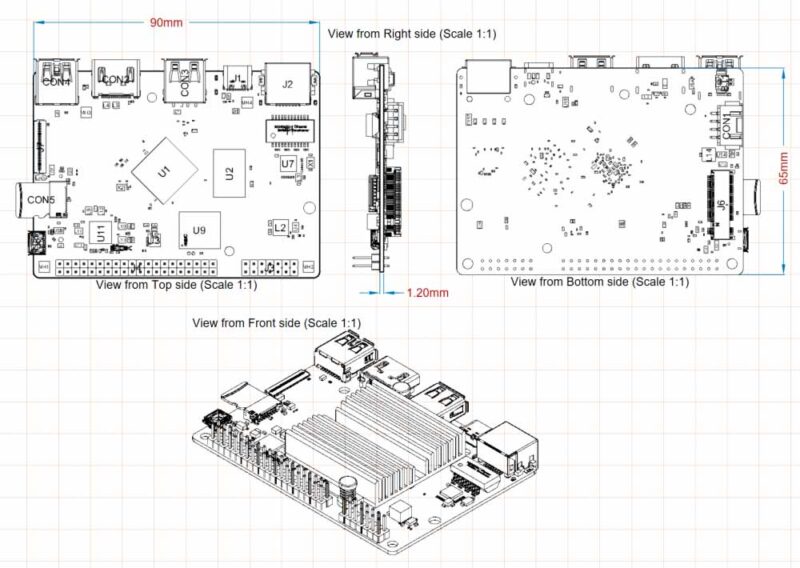
ODROID-M1S (Case, Heatsink, 64GB eMMC, and Power Supply Included)
ODROID launched ODROID-M1 in approximately March 2022, supplying it to numerous B2B and B2C customers. Responding to valuable feedback requesting a more competitive price, increased GPIO ports, lower power consumption, a sleeker form factor, and diverse practical peripherals, ODROID is thrilled to introduce the ODROID-M1S.
Developed over six months to meet market demands, the ODROID-M1S boasts a 20% reduction in thickness, a 20% decrease in power consumption, and the inclusion of a built-in 64GB eMMC chip on the board. In addition, the starting price includes a case, heatsink, and power adapter - this enhancement is poised to significantly cut the costs associated with creating your own affordable and sustainable embedded systems. To underscore the commitment to longevity, particularly for industrial applications, ODROID pledges to supply this product until at least 2036.
Leveraging 3D modeling from the early PCB design stage enabled precise and swift case development. This marks a memorable development project where collaboration between circuit design and mechanical design proceeded seamlessly, leaving a lasting impression on our innovative journey.
M1S PCB 3D model
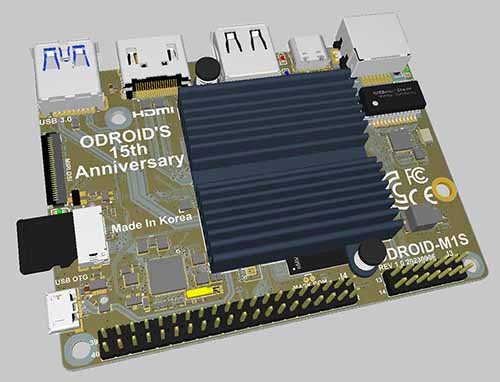
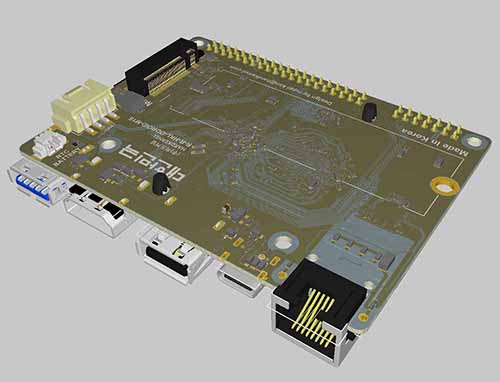

FEATURES AND BENCHMARKS
The SOC in the M1S is the RK3566, which is the younger sister of the RK3568 used in the original M1. This allows most of the software development to be reused. Because the bootloader and kernel settings are different, existing OS images for M1 cannot be used as-is, but porting is quickly possible through a simple process.
For detailed internal configuration, please refer to the block diagram below.
On-board eMMC storage
For the first time in the ODROID board series, an eMMC chip was soldered to the PCB by default instead of using a removable eMMC module. We think 64GB capacity is sufficient for building most embedded systems.
The speed of eMMC measured with the fio command is approximately 180MiB/s, which is about 3~5 times faster than typical microSD cards.
On-board M.2 NVMe slot
In case the 64GB storage space of the soldered eMMC memory is insufficient, consider using an industry standard 2280 form factor NVMe SSD. An on-board M.2 NVMe slot is provided to access large amounts of data storage.
Unlike the original M1 model’s PCIe 3.0 x 2 lanes configuration, M1S has PCIe 2.1 x 1 lane. The NVMe transfer speed of the M1S has been reduced by about 1/4. However, we still believe that ~400 MiB/s of storage access speed is sufficient for building various high-end embedded systems.
Note that M.2 SATA storage devices can not be used. The M.2 slot supports only a PCIe interface (M-Key).
Power consumption
To create the graph below, we turned on the M1S and recorded the power consumption until the Ubuntu Desktop OS boots and enters Idle mode. We used the SmartPower3 device to examine power characteristics.
-With Ethernet and HDMI monitor connected, the peak power consumption is close to 3.7 Watts during booting, but drops to 1.5 Watts in desktop GUI idle state.
-If you remove the HDMI monitor for a headless system, power consumption in idle mode drops to near 1.0 Watt. Additionally, please note that when the Ethernet cable is unplugged, the power drops to 0.7 Watt.

When performing a CPU stress test without either HDMI output or Ethernet connection, the power consumption is about 3.2 Watts. This shows an energy savings of about 25% compared to the 4.3 Watts of the original ODROID-M1 under the same test conditions. Note that the computing power of ODROID-M1S has been measured to be 5-10% lower than that of M1.
Thermal Characteristics
Thermal throttling does not occur even when performing a CPU stress test while mounted in a case. Because system power consumption is low, less heat is generated. Cooling is sufficient with just the stock heatsink.
As shown in the graph below, when a stress test was performed on ODROID-M1S with a stock heatsink under room temperature conditions of 25°C, the CPU temperature did not exceed 65°C and maintained the maximum clock frequency.
Even when assembled in the case, the CPU temperature did not exceed 75°C and thermal throttling did not occur.
SPECIFICATIONS
| Form Factor | Board Dimensions: 90mm x 65mm x 16mm Weight: 52g including heatsink |
|---|---|
| Processor |
Rockchip RK3566 Processor |
| NPU | 0.8 TOPS@INT8, Integrated AI accelerator RKNN NPU Supports one-click switching of Caffe/TensorFlow/TFLite/ONNX/PyTorch/Keras/Darknet |
| Memory | LPDDR4 4 or 8GiB with 32-bit bus width, Data rate: 2112 MT/s, up to 1,055MHz |
| Storage | 1 x 64GB eMMC embedded (soldered to the PCB) 1 x Micro SD slot (UHS-I SDR104, Boot priority is always higher than eMMC) 1 x NVME M.2 SSD (PCIe 2.1 x 1 lane) |
| Networking | 1 x GbE LAN ports (RJ45, supports 10/100/1000 Mbps) – Realtek RTL8211F Ethernet transceiver – LED indicators * Green LED: Flashing by data traffics at 100Mbps connection * Amber LED: Flashing by data traffics at 1000Mbps connection |
| Video | 1 x HDMI 2.0 (up to 4K@60Hz with HDR, EDID) 1 x MIPI DSI Interface (30pin connector which is different from 31pin of the original ODROID-M1) |
| External I/O | 1 x USB 2.0 host port 1 x USB 3.0 host port 1 x USB 2.0 micro OTG port 1 x Debug serial console (UART) 1 x 40 pin GPIO and 1 x 14 pin GPIO |
| Other features | RTC backup battery connector (to keep time and date for several months without main power input) System LED Indicators: – Red (POWER) – Solid light when DC power is connected – Blue (ALIVE) – Flashing like heartbeat while Kernel is running. Solid On in the u-boot stage. |
| Power | 1 x USB Type C for Power only DC input : 4.9V ~ 5.3V – USB Type C 5V/3A power adapter is recommended – IDLE : ≃ 1.1W – CPU Stress : ≃ 3.52W (Performance governor) – Power Off : ≃ 0W |
Board Detail
| 1 | Rockchip RK3566 CPU | 10 | 1 x MIPI DSI 4Lane |
| 2 | LPDDR4 RAM | 11 | 1 x M.2 LED Indicator |
| 3 | 1 x 64GB eMMC embedded | 12 | 1 x Micro SD Slot |
| 4 | 1 x Ethernet Transformer | 13 | 1 x Micro USB2.0 OTG |
| 5 | 1 x RJ45 Ethernet Port (10/100/1000) | 14 | 40 x GPIO Pins Optional |
| 6 | 1 x USB Type C Power Connector | 15 | 14 x GPIO Pins Optional |
| 7 | 1 x USB 2.0 | 16 | 1 x RTC Backup Battery Connector |
| 8 | 1 x HDMI 2.0 | 17 | 1 x UART for System Console |
| 9 | 1 x USB 3.0 | 18 | 1 x M.2. M-KEY PCIe2.1 1Lane |
NOTES
- The CPU has four ARM Cortex-A55 processors with low power consumption & high efficiency operation at 1.8Ghz. A larger 8GB of LPDDR4 DRAM memory is available in addition to a 4GB model for reduced cost.
- We recommend powering the ODROID-M1S with a bundle Type C 5V/3A power adapter.




